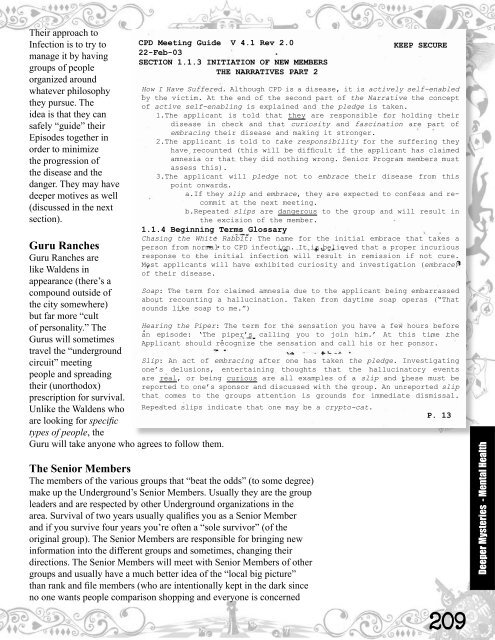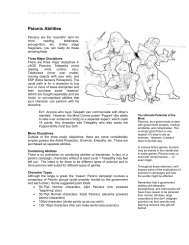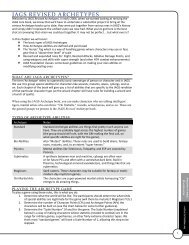Wonderland - Jags
Wonderland - Jags
Wonderland - Jags
You also want an ePaper? Increase the reach of your titles
YUMPU automatically turns print PDFs into web optimized ePapers that Google loves.
Their approach to<br />
Infection is to try to<br />
manage it by having<br />
groups of people<br />
organized around<br />
whatever philosophy<br />
they pursue. The<br />
idea is that they can<br />
safely “guide” their<br />
Episodes together in<br />
order to minimize<br />
the progression of<br />
the disease and the<br />
danger. They may have<br />
deeper motives as well<br />
(discussed in the next<br />
section).<br />
Guru Ranches<br />
Guru Ranches are<br />
like Waldens in<br />
appearance (there’s a<br />
compound outside of<br />
the city somewhere)<br />
but far more “cult<br />
of personality.” The<br />
Gurus will sometimes<br />
travel the “underground<br />
circuit” meeting<br />
people and spreading<br />
their (unorthodox)<br />
prescription for survival.<br />
Unlike the Waldens who<br />
are looking for specific<br />
types of people, the<br />
Guru will take anyone who agrees to follow them.<br />
CPD Meeting Guide V 4.1 Rev 2.0<br />
22-Feb-03<br />
SECTION 1.1.3 INITIATION OF NEW MEMBERS<br />
THE NARRATIVES PART 2<br />
The Senior Members<br />
The members of the various groups that “beat the odds” (to some degree)<br />
make up the Underground’s Senior Members. Usually they are the group<br />
leaders and are respected by other Underground organizations in the<br />
area. Survival of two years usually qualifies you as a Senior Member<br />
and if you survive four years you’re often a “sole survivor” (of the<br />
original group). The Senior Members are responsible for bringing new<br />
information into the different groups and sometimes, changing their<br />
directions. The Senior Members will meet with Senior Members of other<br />
groups and usually have a much better idea of the “local big picture”<br />
than rank and file members (who are intentionally kept in the dark since<br />
no one wants people comparison shopping and everyone is concerned<br />
KEEP SECURE<br />
How I Have Suffered. Although CPD is a disease, it is actively self-enabled<br />
by the victim. At the end of the second part of the Narrative the concept<br />
of active self-enabling is explained and the pledge is taken.<br />
1.The applicant is told that they are responsible for holding their<br />
disease in check and that curiosity and fascination are part of<br />
embracing their disease and making it stronger.<br />
2.The applicant is told to take responsibility for the suffering they<br />
have recounted (this will be difficult if the applicant has claimed<br />
amnesia or that they did nothing wrong. Senior Program members must<br />
assess this).<br />
3.The applicant will pledge not to embrace their disease from this<br />
point onwards.<br />
a.If they slip and embrace, they are expected to confess and recommit<br />
at the next meeting.<br />
b.Repeated slips are dangerous to the group and will result in<br />
the excision of the member.<br />
1.1.4 Beginning Terms Glossary<br />
Chasing the White Rabbit: The name for the initial embrace that takes a<br />
person from normal to CPD infection. It is believed that a proper incurious<br />
response to the initial infection will result in remission if not cure.<br />
Most applicants will have exhibited curiosity and investigation (embrace)<br />
of their disease.<br />
Soap: The term for claimed amnesia due to the applicant being embarrassed<br />
about recounting a hallucination. Taken from daytime soap operas (“That<br />
sounds like soap to me.”)<br />
Hearing the Piper: The term for the sensation you have a few hours before<br />
an episode: ‘The piper’s calling you to join him.’ At this time the<br />
Applicant should recognize the sensation and call his or her ponsor.<br />
Slip: An act of embracing after one has taken the pledge. Investigating<br />
one’s delusions, entertaining thoughts that the hallucinatory events<br />
are real, or being curious are all examples of a slip and these must be<br />
reported to one’s sponsor and discussed with the group. An unreported slip<br />
that comes to the groups attention is grounds for immediate dismissal.<br />
Repeated slips indicate that one may be a crypto-cat.<br />
P. 13<br />
209<br />
Deeper Mysteries - Mental Health





